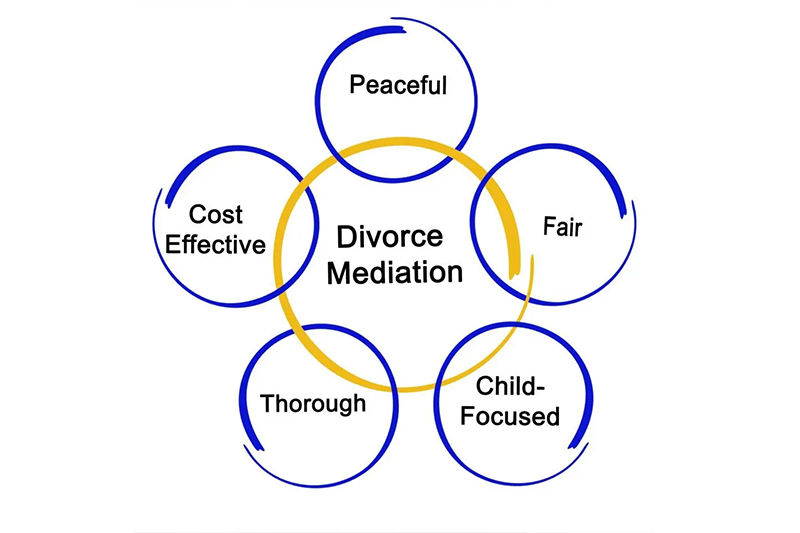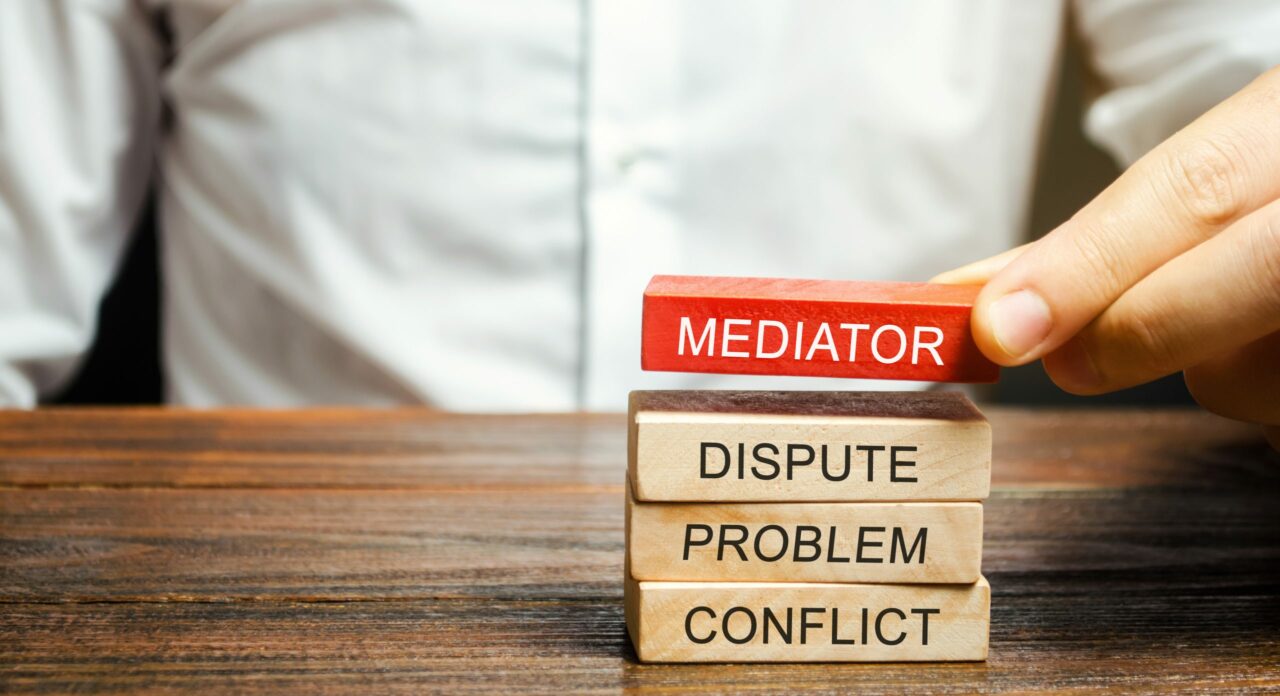What is Mediation?
Mediation is a process that can be used to resolve conflicts and disputes, particularly in the context of divorce. It involves the presence of a neutral third party, known as a mediator, who helps facilitate communication and guide the parties toward a mutually agreeable solution.
Mediation provides a non-adversarial alternative to a courtroom battle, allowing individuals to maintain control over the decision-making process and work towards a resolution that meets their unique needs.
During a mediation session, the mediator creates a safe and supportive environment for open communication. The mediator remains impartial and aids the parties involved in examining their interests, needs, and concerns without taking sides or making decisions for them.
This collaborative approach encourages empathy and understanding between the parties, fostering an atmosphere that promotes problem-solving and compromise.
By providing a structured platform for open dialogue, mediation allows for more creative and flexible solutions that may not be available through a court-imposed decision.
It is important to note that while mediation is highly effective in many cases, it may not be suitable for every situation.
In cases involving domestic violence or severe power imbalances, mediation may not be the best option.

What are the Benefits of Choosing Mediation for Your Divorce?
When going through a divorce, emotions can run high, and it’s easy for conflicts to escalate. It’s a time of immense change and uncertainty, and finding a way to navigate these difficult issues can seem daunting.
Greater control over the outcome: Mediation empowers both parties to actively participate in the decision-making process. Unlike traditional litigation, where a judge makes final rulings, mediation allows couples to have a say in shaping their post-divorce lives.
With the guidance of a neutral mediator, the couple can explore their interests, needs, and concerns and work together to find resolutions that work best for them and their children. This collaborative approach fosters a sense of ownership and can lead to more satisfactory outcomes.
Enhanced communication and understanding: Divorce often involves complex emotions and strained relationships. The mediator’s role is to remain neutral and facilitate discussions, ensuring that both parties feel heard and validated.
By engaging in productive conversations, couples can gain a better understanding of each other’s perspectives and needs. This increased empathy and communication can lay the foundation for improved co-parenting and post-divorce relationships.
Cost-effective option: The financial implications of divorce can be significant. Traditional litigation can be lengthy and expensive, with each party having to pay for their own attorney fees and court expenses.
Mediation, on the other hand, tends to be more affordable. The couple shares the cost of mediation, making it a cost-effective alternative. Mediation sessions are often quicker than court proceedings, reducing the overall financial burden.
Tailored solutions for sensitive issues: Divorce often involves complex matters such as child custody for minor children and property division. These issues can be emotionally charged and require careful consideration.
Mediation provides a structured platform for discussing these matters, ensuring that the concerns and best interests of all parties, especially the children, are taken into account.
The mediator assists in generating creative and flexible solutions that may not be available through a court-imposed decision. This customized approach can lead to more sustainable and amicable resolutions.
Reduced likelihood of future conflicts: One of the significant advantages of mediation is its ability to promote future harmony. By actively participating in the decision-making process, couples are more likely to feel satisfied with the outcome.
This increased satisfaction, coupled with the improved communication skills developed during mediation, can help reduce the chances of future conflicts. This, in turn, benefits the children involved, minimizing the impact of the divorce on their well-being.
Divorce mediation is a viable alternative for most couples who are facing divorce. If you separate in 2023, speaking with a mediator at the start of a separation might be the key to keeping your divorce out of the courthouse and saving you thousands of dollars in legal fees. [1]
Factors to Consider When Deciding on Divorce Mediation.
Who Should Consider Divorce Mediation:
Couples with a willingness to communicate: Mediation requires open and honest communication between both parties. If you and your spouse are willing to engage in productive discussions and work together to find solutions, mediation can be a beneficial option. The willingness to compromise and negotiate is key to a successful mediation process.
Couples looking for greater control: If you prefer to have more control over the outcome of your divorce, mediation is worth considering.
Couples focused on preserving relationships: Mediation is a viable option for couples who want to maintain a level of goodwill and preserve their relationships, especially when children are involved. By engaging in open dialogue and finding common ground, you can lay the foundation for improved co-parenting and future interactions.
Couples who value cost-effective solutions: Mediation is generally less expensive than traditional litigation. Sharing the cost of a mediator can significantly reduce the financial burden associated with divorce.
Who Shouldn’t Consider Divorce Mediation:
Cases involving domestic violence or power imbalances: If there is a history of domestic violence or severe power imbalances in your relationship, mediation may not be the appropriate approach. It’s important to prioritize your safety and well-being and seek legal counsel for alternative options that ensure your protection.
Couples unwilling to compromise: Mediation requires both parties to be willing to negotiate and find mutually acceptable solutions. If one or both spouses are unwilling to compromise or engage in productive dialogue, mediation may not be a feasible option.
Couples with complex financial or legal matters: In some cases, divorce involves complex financial or legal matters that require specialized expertise. If your divorce includes extensive assets, substantial debt, or intricate legal issues, consulting with a divorce lawyer may be necessary to ensure your rights and interests are adequately protected.
Couples experiencing high conflict and hostility: Mediation works best when both parties are open to constructive conversations. If your relationship is characterized by constant conflict, high levels of hostility, or an inability to communicate effectively, mediation may not be the most effective approach. In such cases, alternative dispute resolution methods, such as litigation or collaborative divorce, may be more appropriate.
The Divorce Mediation Process
The mediation process typically begins with an initial consultation, where the mediator explains their role, the process, and sets expectations for both parties. It is important to choose a mediator who is qualified, experienced, and preferably trained in family law or divorce mediation.
During mediation sessions, both spouses, along with their respective mediation attorneys if they choose to have legal representation present, engage in open and constructive conversations. The mediator ensures that both parties have an equal opportunity to express their concerns, needs, and desires. They help identify the key issues to be resolved, such as child custody, property division, and financial support, and guide the couple toward potential solutions.
Throughout the process, the mediator fosters effective communication, encourages compromise, and facilitates negotiations with the end goal of reaching a mutually satisfactory agreement. If necessary, the mediator may also provide legal information to help the couple understand the implications of their decisions and make informed choices.
Mediation offers a private and confidential environment for discussions. Unlike court proceedings, which are a matter of public record, mediation allows the couple to address sensitive topics without the fear of exposing personal matters to the public.
Before Mediation
Educate Yourself: Familiarize yourself with the mediation process and its benefits. Understand what to expect during mediation sessions, the role of the mediator, and the potential outcomes. Knowing the basics will help you approach the process with confidence and make informed decisions.
Define Your Goals: Take some time to think about your desired outcomes and specific goals for the mediation. Whether it’s child custody arrangements, division of property, or financial support, having a clear idea of what you want to achieve will guide your discussions during mediation.
Gather Information: Collect all relevant documents and information related to the divorce, such as financial records, property documentation, and any existing agreements or court orders. Having these materials readily available will facilitate the mediation process and ensure that both parties have access to accurate information.
Seek Legal Advice: While mediation is a more collaborative approach to divorce, it’s still essential to consult with a qualified divorce attorney. An attorney can offer legal advice, review any proposed agreements, and ensure that your rights and interests are protected throughout the process. They can help you understand the implications of various decisions and provide guidance on what may be a fair compromise.
Consider the Best Time: Timing is crucial when it comes to mediation. Choosing the right time, when both parties are relatively calm and ready to engage in constructive discussions, can significantly increase the chances of a successful resolution. Avoid scheduling mediation sessions during times of high emotional stress or when external factors may interfere with the process.
Reflect on Communication Styles: Take a moment to reflect on your communication style and how it may impact the mediation process. Consider your strengths and weaknesses when it comes to expressing your needs and concerns. Reflecting on your communication patterns can help you approach the mediation sessions with a constructive mindset and effectively convey your thoughts.
Manage Expectations: It’s important to approach mediation with realistic expectations. While the goal is to reach an agreement, it may not always be possible to reach a perfect solution that satisfies all parties completely. Understanding this beforehand will prevent disappointment and allow for a more flexible and cooperative mindset during the process.
The preparation process helps you enter the sessions with clarity, confidence, and a genuine commitment to finding common ground.
During Mediation
One of the primary benefits of mediation is that it provides a safe and non-adversarial environment for both parties to express their concerns, needs, and perspectives. This direct interaction can foster a greater understanding of each other’s positions and increase the likelihood of finding common ground.
The mediator does not make decisions or impose solutions but instead helps the parties find their own solutions that meet their underlying interests. This allows the parties to maintain control over the outcome.
It is important to note that during mediation, the parties are responsible for making informed decisions. This means that they should have a good understanding of the relevant legal and financial implications of their choices.
Successful mediation requires both parties to be willing to engage in an open and honest dialogue. The parties should be prepared to listen actively, respect each other’s opinions, and be open to compromise.
It is through this spirit of cooperation and understanding that the parties can achieve resolution, not only for the immediate issues at hand but also for any future conflicts that may arise.
Completing the Agreement
The completion of the agreement is a testament to the effectiveness of mediation in resolving conflicts. Unlike a court-ordered decision, where one party may feel like they have “won” and the other has “lost,” mediation allows for a more balanced and fair resolution.
Each party has had the opportunity to express their viewpoints, and their input has been taken into account throughout the process. This level of involvement often leads to greater satisfaction with an agreeable outcome.
Once the parties have reached an agreement on each issue, the mediator helps put their agreement in writing.
This is typically done in the form of a settlement agreement, which outlines the terms and conditions of the resolution. The agreement is a legally binding document that can be enforced in court if necessary.
The parties review the agreement carefully before signing it. They should ensure that it accurately reflects the discussions and decisions made in mediation. Seeking legal advice during this stage can be beneficial to ensure that the agreement aligns with the parties’ rights and obligations under the law.
Once both parties are satisfied with the terms of the agreement, they can sign it, finalizing their resolution. This act of signing represents the culmination of their mediation journey and signifies their commitment to moving forward in a mutually agreeable manner.
Completing the agreement not only brings a sense of closure to the divorce process but also provides a roadmap for the future. The parties now have a clear understanding of their rights, responsibilities, and expectations. This clarity can help prevent future conflicts and promote a more harmonious coexistence.

The Goal of Divorce Mediation is to Reach an Agreement, Rather than Win a Case.
The goal of divorce mediation is to help couples transition from a contentious relationship to one of mutual respect and cooperation.
While winning a case may bring temporary satisfaction, it often leaves a trail of bitterness and resentment.
On the other hand, reaching an agreement through mediation promotes a healthier and more sustainable path forward, paving the way for a more peaceful and amicable post-divorce relationship.
If you are looking for an experienced Jacksonville divorce attorney, we would be more than glad to help you in any of your family law matters.
Sources:
[1] DeAngelis, R. (2023, January 30). Divorce Mediation: Definition, Pros & Cons (2023 Guide). Forbes Advisor. https://www.forbes.com/advisor/legal/divorce/divorce-mediation/


